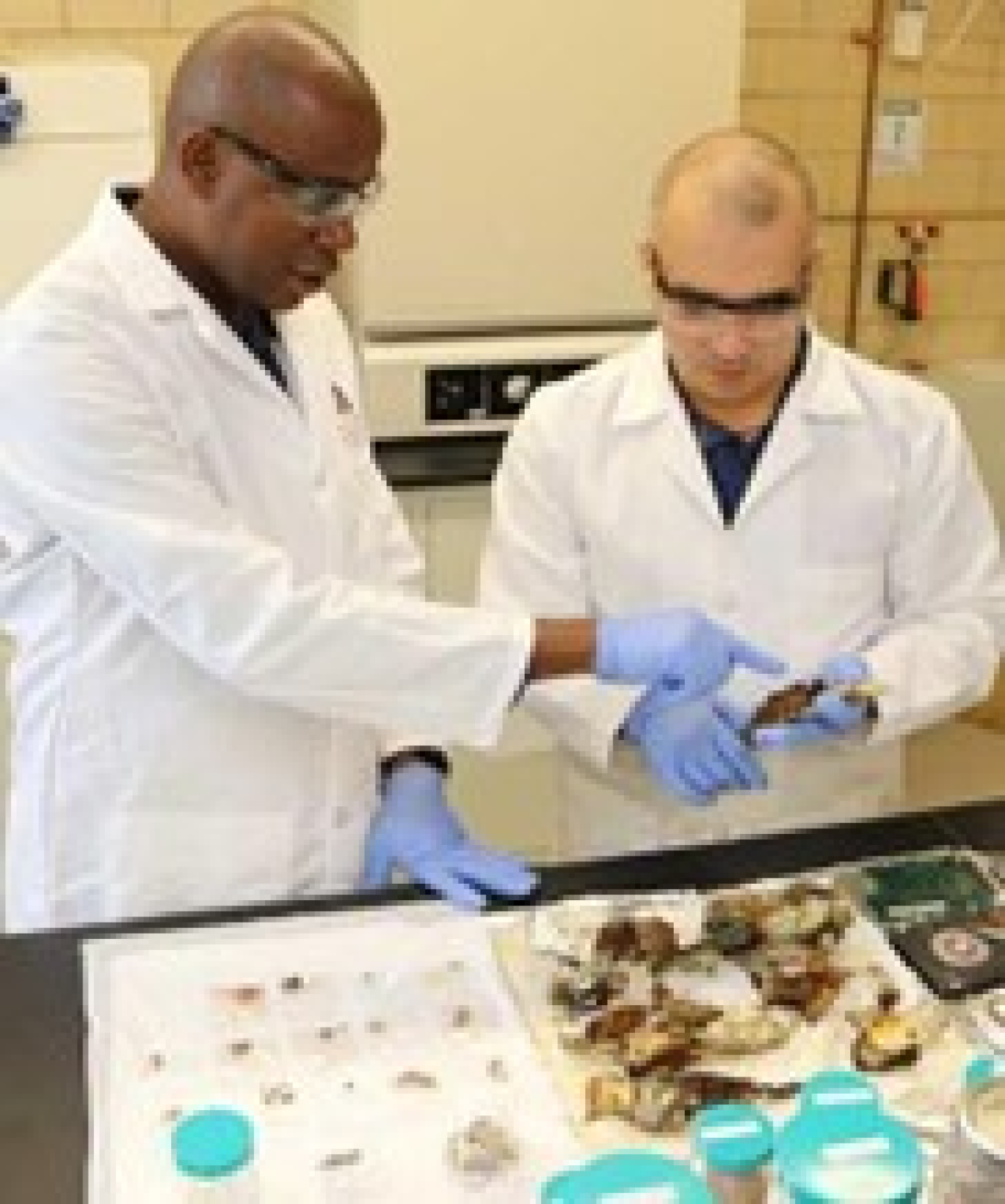Many people are unaware of how complex and cost-prohibitive recycling can be. Recycling processes may also involve hazardous acids that can be harmful to the environment, especially when it comes to recycling electronic waste (e-waste).
Advanced Materials & Manufacturing Technologies Office
March 13, 2023Many people are unaware of how complex and cost-prohibitive recycling can be. Recycling processes may also involve hazardous acids that can be harmful to the environment, especially when it comes to recycling electronic waste (e-waste). This is where leaders at the Critical Materials Institute (CMI), with funding from the Advanced Materials and Manufacturing Technologies Office (AMMTO) and Iowa State University, come in. CMI is exploring new ways to recycle that are greener for the environment, better for businesses, and critical for a clean energy economy.

Since 2016, CMI has been working on acid-free dissolution recycling (ADR) and chemical recovery of rare earth elements (REE), critical materials found in magnets in e-waste. REE magnets are critical components for electronic items such as cell phones and hard disk drives and clean energy technologies like offshore wind turbines. The demand for REE magnets is expected to increase significantly, as discussed in DOE’s 2022 supply chain report on neodymium magnets. However, their supply chain is not always reliable; partly due to the limited supply sources of REEs. There are extensive benefits to recycling REE magnets – if done correctly, it can be an environmentally preferable solution, and it can tackle concerns and challenges surrounding accessibility of REEs.
In 2018, CMI researchers were awarded a patent on the ADR process. That year, they also received two R&D 100 awards for using oxidative dissolution to remove REEs from existing waste. By utilizing a water-based solution, the team developed a process that was more adaptable for recycling REEs, which cut down on REE losses in landfills and allowed for less reliance on mining. In 2019, this CMI project won a TechConnect Innovation Award.
CMI’s Ikenna Nlebedim, who is deputy lead for the CMI Focus Area: Developing Substitutes, says “The acid-free dissolution recycling process is highly selective for REEs in pre-concentrated magnets, as well as magnets in dilute waste streams – a unique feature that demonstrates the technology’s robustness.”
Come 2021, TdVib LLC (TdVib), who signed a licensing agreement for this technology, and CMI researchers, were initially awarded $200,000 for a Phase I Small Business Technology Transfer (STTR) to improve the CMI-developed ADR process. The team was awarded $1 million in Phase II of the project and are working to commercialize the novel technology to recycle REEs from e-waste.
TdVib and Ames’ combined efforts to scale up the recycling process without any acids and limit, or even eliminate, the generation of any waste makes for an overall greener and environment-friendly process. This recycling process also removes the need for pre-heating, which sets it apart from other recycling processes used to demagnetize REE magnets. The ability to eliminate pre-heating lessens the impacts of pollution, while also decreasing energy usage.
In 2022, the Iowa State University Research Foundation and TdVib signed an exclusive license agreement for the ADR process technology. That same year, TdVib also produced commercial material (rare earth oxide) that was refined into an REE metal – a material that is further processed into REE magnets. Currently, collaborative efforts are underway to produce three to five tons of rare earth oxide in the next couple of years, which is a crucial part of the REE magnet supply chain for clean energy technologies, such as electric motor vehicles, or even consumer electronics like hard disk drives.
TdVib’s President and Chief Executive Officer Dan Bina says the ADR technology “continues to excite me with the vast potential to recover rare earths from previously unobtainable sources,” including e-waste.
As of 2023, Ames National Lab and TdVib continue to work together through CMI to explore the application of the acid free recycling process to recover critical materials from other dilute waste streams, such as end-of-life medical devices. For more information detailing ongoing developments and next steps, visit the CMI’s project page.
***
The Advanced Materials and Manufacturing Technologies Office (AMMTO) supports the advancement of technologies to make the U.S. manufacturing sector more competitive and build a clean, decarbonized economy. AMMTO has three major program teams: next generation materials and processes, secure and sustainable materials, and energy technology manufacturing and workforce. These programs will meet our goals of manufacturing clean energy technologies domestically, develop secure and sustainable supply chains, and to support a skilled and inclusive manufacturing workforce. Read more about AMMTO here.
CMI, an Energy Innovation Hub led by Ames National Laboratory, is funded by AMMTO. Since its inception in 2013, CMI research has been awarded 30 U.S. patents, licensed 12 technologies, received five Federal Laboratory Consortium awards and seven R&D 100 Awards. Learn more about CMI here.
Ames National Laboratory is one of DOEs 17 national laboratories that is located at Iowa State University, enjoying a partnership that reached a milestone of 75 years as of 2022. With an annual budget of $60 million, Ames has been able become global leaders in the application of new materials, research of clean energy technologies, as well as commercialization efforts. Read more about Ames Lab here.
TdVib, LLC develops the design and manufacturing of electromagnetic systems that are both technology-driven and high-value. Learn more about TdVib, LLC here.

